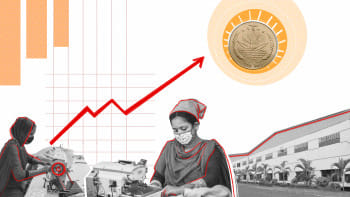You can’t quell workers’ hunger by opening fire on them

To the outrage of the workers and trade unions who have been demanding a minimum wage of Tk 23,000-25,000, the wage board for the garment sector has announced a pitiful amount—Tk 12,500—as the monthly wage. The announcement came on November 7, hours after garment factory owners reportedly submitted a new proposal on the minimum wage for apparel workers in Bangladesh, revising it from the initially proposed Tk 10,500 to upwards of Tk 12,500. Essentially, the wage board has put forth the same proposal as that of the owners, which makes the answer to the question of "whose interests is the board really protecting?" painfully obvious. The worker's representative who deemed the announced wage "acceptable" was Sirajul Islam Ronny, president of the Bangladesh Garment Workers League, whose affiliation to the ruling party should leave no confusion regarding where his loyalties lie.
What other conclusion can one reach based on the proposed wage anyway? Since the last minimum wage was declared at Tk 8,000 (which was woefully inadequate to begin with, against workers' demands for Tk 16,000), the value of money has depreciated at an alarming rate. We shouldn't have to remind the wage board—yet we must, given that they seem to be inhabiting a different reality—that the prices of essentials have increased manifold during this period. Taking TCB prices into consideration, noted economist Anu Muhammad calculated that, between September 24, 2018 to September 24, 2023, the price for rice has increased by 15 percent, that for lentils by 120 percent, potatoes by 80 percent, salt by 68 percent, eggs by 67 percent, milk by 100 percent, sugar by 120 percent, chicken by 48 percent, and the price for fish has increased by 100 percent. Over the last two months, these prices have risen even higher, with the government seemingly nonplussed about the raging cost-of-living crisis that has destroyed any prospects of living a nutritious and dignified life for ordinary citizens, particularly for the lower-middle and working classes.
According to a study by the Centre for Policy Dialogue in March, the average monthly food expense for a four-member household in Dhaka increased by up to 51 percent over the past four years. Even if a family refrained from eating meat or fish for a whole month, they would have had to spend at least Tk 7,131 in February (which would be close to Tk 8,000 in November, with food inflation at record levels) and around Tk 22,664 if they did include these protein sources in their diet. The wage board, meanwhile, has allocated Tk 1,250 as food allowance. Can we please urge the members of the wage board and their families to live off of their proposed food allowance for a month? Perhaps the factory owners and policymakers think our "resilient" workers don't need protein or vegetables to survive and can simply load up on cheap rice (even that is an oxymoron these days, with coarse rice costing Tk 60 per kg in the industrial belts) and silently meet their ever-increasing production targets on the factory floor. They regularly point to Bangladeshi workers' low productivity to justify the low wages. But do they ever stop to wonder how productive a systematically starved population can really be?
In 2018, the minimum wage was $95. At the current exchange rate, that comes up to around Tk 10,500, which is the amount that the owners (who earned about Tk 90,000 crore, in addition to their usual profits as a result of the inflated dollar price, last year alone) had the audacity to recommend initially to the wage board as the new minimum wage. Is it any surprise, then, that the desperate workers took to the streets to express their deep-rooted frustration upon hearing this offer?
Rather than assuage the workers by announcing a respectable wage, the wage board has essentially fuelled workers' outrage and made a mockery of the wage negotiation process, after making them wait seven long months. The government and factory owners—whose respective interests have increasingly become inseparable, with almost one-third of MPs having stakes in garment factories—seem to think they can silence the workers with their tried-and-tested method of suppression. A worker of Islam Garments, 28-year-old Anjuara Khatun—mother to a seven-year-old-boy and an eight-year-old girl—was shot dead by law enforcers who opened fire on the protestors in Gazipur a day after the wage announcement. Anjuara and her husband, Jamal, used to earn around Tk 21,000 collectively, but still could not afford to keep their two children with them. As fate would have it, the children had gone to visit them; now, they must leave their parents' home, forever haunted by their mother's pellet-ridden body.
Rather than assuage the workers by announcing a respectable wage, the wage board has essentially fuelled workers' outrage and made a mockery of the wage negotiation process, after making them wait seven long months. The government and factory owners—whose respective interests have increasingly become inseparable, with almost one-third of MPs having stakes in garment factories—seem to think they can silence the workers with their tried-and-tested method of suppression
Twenty-six-year-old Rasel Hawlader, an electrician at Design Express Ltd in Gazipur, was shot in the chest by police at close range, according to witnesses. Will anyone ever answer for these extrajudicial killings? There is no evidence that either Anjuara or Rasel were involved in the vandalism that the police accuse the workers of. But even if they were part of the mob that had thrown bricks at other factories to urge workers to join the protests, would it justify police opening fire on them? Are the factory premises really so much more valuable to the state and the owners than the lives of the workers who hold up Bangladesh's RMG industry?
Let's face it: the state only notices the workers when they supposedly engage in violence—when they block the roads, disrupt our mobility, and allegedly attack heavily-insured factory premises. For the rest of the months, or years, our policymakers remain blissfully oblivious of the toll to workers' mental and physical well-being and of their repeated pleas to bring food prices down. Come wind or storm, come Covid or economic crisis, our workers keep their heads down and quietly meet their production targets. But anytime they dare to speak up, they are fired, threatened, beaten, and even killed, by hired goons or state machineries, if need be. At least seven cases have already been filed against tens of thousands of unnamed workers; and hundreds—if not thousands—of them will likely be fired and blacklisted in the coming days for participating in the strikes. Who knows how many more will be attacked, beaten, maimed, or even killed before the protests are quelled?
Perhaps it is true that some workers engaged in vandalism during the protests, and maybe some of them were misguided by other parties who had bigger stakes in the game in the current volatile political climate. But the wage board, garment factory owners, and the government have only themselves to blame for pushing the workers to the extreme. The government has categorically failed to rein in inflation, and has paid no attention to workers' demands to be provided with rations or bring down food prices if it is indeed unable to increase their wages to the desired amount. Instead, the government has sent a loud and clear message to the workers: that it has no respect for their lives or their lived realities, and that it would rather use bullets than bargain with them.
But for how long can bullets suppress hunger, or the workers' demand for a dignified life?
Sushmita S Preetha is op-ed editor at The Daily Star.
Follow The Daily Star Opinion on Facebook for the latest opinions, commentaries and analyses by experts and professionals. To contribute your article or letter to The Daily Star Opinion, see our guidelines for submission.

 For all latest news, follow The Daily Star's Google News channel.
For all latest news, follow The Daily Star's Google News channel. 











Comments